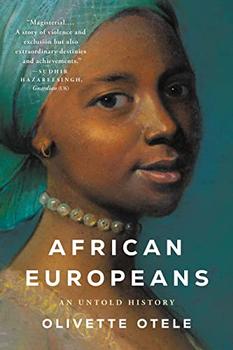Summary | Excerpt | Reviews | Beyond the book | Read-Alikes | Genres & Themes | Author Bio

An Untold History
by Olivette OteleThe nexus of Africans and Europeans is not a recent historical development. Rather, the peoples of Africa and Europe have a long and complex history that — for many centuries, at least — transcended modern notions of race through artistic, intellectual and social interactions.
There is evidence of cultural and social intermingling and appreciation between Africans and Europeans from antiquity to the onset of the transatlantic slave trade that stands in stark contrast to our contemporary perceptions. Olivette Otele, professor of history and memory of enslavement at the University of Bristol, corrects this historical oversight in her vital new study, African Europeans: An Untold History, as she provides "multiple histories as a starting point to learn about the past and to dismantle racial oppression in the present."
The multiple individual histories she brings to the page are captivating. With the overarching goal of showing the 2,000+-year history of Africans in Europe as not just about European colonization and slavery, she relates the stories of those who moved within their own spheres of influence. Ranging as far back as ancient Rome, she tells the story of Septimius Severus, the Roman Empire's first African emperor. Moving from ancient times to the Renaissance, Otele delves deeply into the life of Alessandro de' Medici, the first Medici duke of Florence. Alessandro is believed to have been the son of Lorenzo de' Medici and a free African woman, but "Italian society in the sixteenth century, despite occasional denigration of black Africans, did not find it appropriate to attack the nobleman Alessandro on his ethnicity in the public sphere."
Otele explains that "European views on black Africans in the fifteenth and sixteenth centuries were more nuanced than one would assume centuries later." For instance, "blackness," and other racial/ethnic labels, were not necessarily the key delineator of difference in antiquity; more important in ancient and medieval times were the person's citizenship status or religion. What makes Otele's history so satisfying are the exceptional stories of her subjects, who somehow "defied obscurity to be included in European accounts." However, Otele also explores the conflict inherent in viewing the Africans in these stories through the European lens of "exceptionalism." Viewing these historical personages as exceptional is a means of objectification, and it also suggests that Africans as a whole are/were inferior. And with the imperial race to colonize and cash in on new lands and resources, many a "Christian" empire would rationalize enslavement of Africans based on the notion of "inferiority," as Otele's trenchant chapter on the transatlantic slave trade illustrates to devastating effect.
African Europeans is an academic work that synthesizes a variety of historical studies, both ancient and contemporaneous. The reader will jump between centuries often and read about other scholars and their relevant analyses. When analyzing the historiography of her subject, Otele at times refers to these other studies by the authors' last name only, as if they should be known to the reader. Similar omissions are made when discussing some conceptual frameworks. While explaining how Europeans began to exoticize the "otherness" of African or dual heritage people, for instance, she references the unfortunate story of the "Hottentot Venus," aka Sarah Baartmans, a South African Khoikhoi woman exhibited as a freak show attraction in 19th century Europe, without providing much context. Readers may find themselves doing frequent Google searches.
At the book's conclusion, Otele moves from history to current events and uses the African Europeans of centuries ago as a cri de coeur for the necessity of Black radicalism today. The juxtaposition of these historic lives with the urgency of the Black Lives Matter movement, as well as her call for greater Black female representation in academia, will spur many a reader to greater awareness of the past and what work still needs doing to achieve racial equality and justice.
Overall, African Europeans is essential if sometimes challenging reading. While the text often seems targeted to a peer-reviewing audience, it is the people of Otele's book who steal the show. An ample and diverse bibliography rounds out this brief history to keep the curious engaged and primed for more study.
![]() This review was originally published in The BookBrowse Review in July 2021, and has been updated for the
September 2023 edition.
Click here to go to this issue.
This review was originally published in The BookBrowse Review in July 2021, and has been updated for the
September 2023 edition.
Click here to go to this issue.

If you liked African Europeans, try these:

by Caroline Dodds Pennock
Published 2024
A landmark work of narrative history that shatters our previous Eurocentric understanding of the Age of Discovery by telling the story of the Indigenous Americans who journeyed across the Atlantic to Europe after 1492

by Daisy Dunn
Published 2024
A dazzlingly ambitious history of the ancient world that places women at the center—from Cleopatra to Boudica, Sappho to Fulvia, and countless other artists, writers, leaders, and creators of history
To be ignorant of what occurred before you were born is to remain always a child
Click Here to find out who said this, as well as discovering other famous literary quotes!
Your guide toexceptional books
BookBrowse seeks out and recommends the best in contemporary fiction and nonfiction—books that not only engage and entertain but also deepen our understanding of ourselves and the world around us.